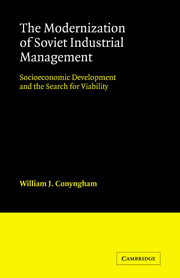 The Modernization of Soviet Industrial Management
The Modernization of Soviet Industrial Management Book contents
Preface
Published online by Cambridge University Press: 07 October 2011
Summary
This study began in a deceptively simple way as an investigation of the impact of the 1965 economic reforms on industrial organization. In an earlier book, Industrial Management in the Soviet Union, my examination of the Communist Party's leading role in industrial decision making had raised several interesting questions that I hoped to pursue more systematically with respect to the reforms. These questions arose quite naturally from Khrushchev's repeated failures to revitalize industrial management in the late 1950s and early 1960s. During those turbulent years, it became strikingly clear that his striving to make the management system viable through the ideological and political mobilization of economic management was quite irrelevant under contemporary conditions. His trial-and-error approach, directed primarily at reorganizing the Party and state bureaucracies, failed to address the massive changes in the Soviet Union that had resulted from socioeconomic development. In a fundamental sense, Khrushchev's experience put into question whether any management system as big and complex as the existing Soviet system can, in fact, be rationally directed and controlled.
In the post-Khrushchev period, the continuing effort to create a modern management system has been simultaneously a reaction to the earlier period and a thrust to transcend it. The lessons of the political backlash that toppled Khrushchev have not been lost upon his successors, who have approached the problems of management cautiously. Nevertheless, there has been a gradually increasing awareness within the political leadership of the formidable challenges that a very complex socioeconomic system presents to a traditionally organized industrial system.
- Type
- Chapter
- Information
- The Modernization of Soviet Industrial ManagementSocioeconomic Development and the Search for Viability, pp. ix - xiiPublisher: Cambridge University PressPrint publication year: 1982
